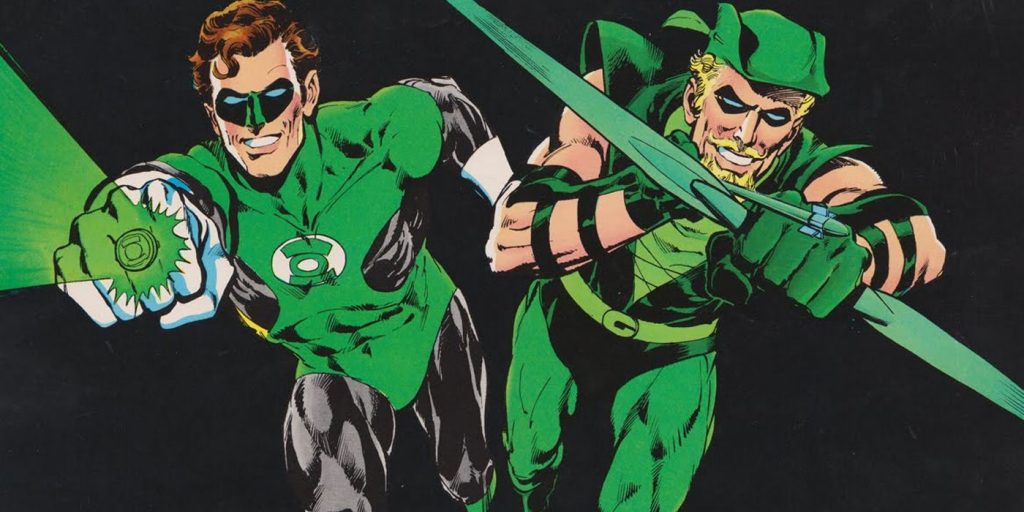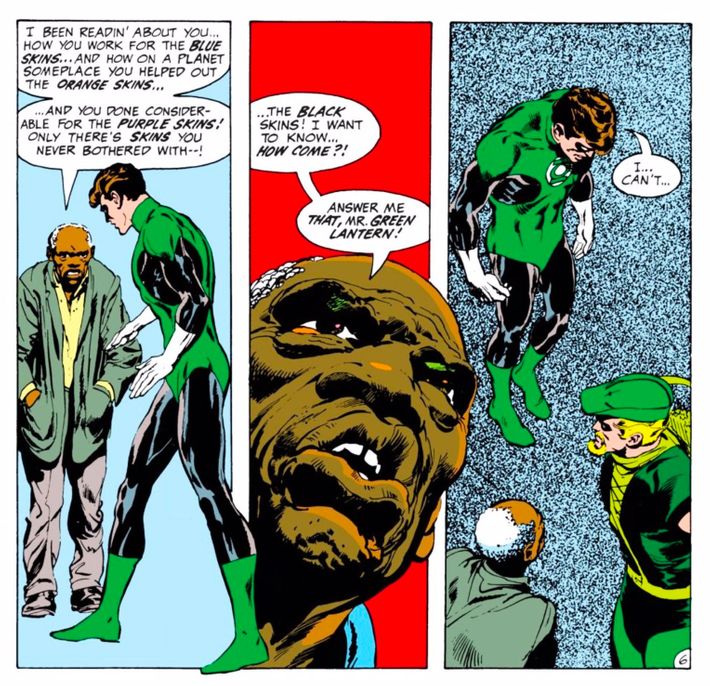
Industry legend Dennis O’Neil has passed. If you’re anywhere near my age, or even been alive the last few decades, he’s been the writer or contributed to… all of this. He’s been intimately involved with not just a golden age of Batman, he’s been there for like 8 golden ages for the character. You can’t shake a stick at a DC product mass produced and not poke something he was involved with. Not a name that any Joe or Jane on the street may know but for those of us who knew… we knew.
And of course most relevant to our greenhouse, Dennis was the writer of what’s probably still the most widely regarded and the most well known run of Green Lantern to date. Heralded for its at the time uncommon topicality, “Hard Traveling Heroes” features Hal Jordan’s first big messaround with Green Arrow. If you don’t know, this is the story where GL and a Guardian of the Universe have America of the seventies inflicted upon them by the recently politically galvanized Oliver Queen. They hit the road (and oftentimes each other) to get a handle on what’s wrong with the soul of America, one extended cultural pastiche at the time. It’s wild as hell. They run into Charlie Manson, Bob Dylan, Harpies, Large Space Women, sidekicks on smack, and Jesus Christ. It’s all arch and overwritten in that seventies style but there’s real anger and purpose and Neal Adams draws like he’s the last person in the world. Read them if you haven’t. It’s dated, sure, but you’ve gotta keep in mind the context of the times. If you buy in, you’re all in. O’Neil is one of the best all around superhero writers that you never hear as much about. His stories keep it moving, they work hard not to be predictable, he wants the people in them to grow and so do you – he has a great touch for characterization. And his style changed to suit the times. If you ever get a chance, his Azrael run is surprising and dynamic. His ‘Gordon of Gotham’ mini is one of my all time favorites. That’s a series that makes Jim Gordon into someone who I couldn’t stand on an ideological level just much as as it locked him in as one of my all time favorite characters.
Famous contemporarily despite its relative briefness, ‘Hard Travelling’ is lots of fun and full of surprises even if you know what you’re getting into. But after the last few weeks, it doesn’t feel good to do a retrospective, or a modern review. Re-reading it today, I mostly found it heartbreaking.

The series has been reprinted many times, and my first exposure to it was a reprint collection my dad got in the 90s. These are great because the issues have introductions written by people involved in the series, including the man himself Dennis O’Neil. In his intro there is a bit about the history of the series but mostly it’s about the moment in time that he wrote it. About how he wrote it as a reaction, how he wanted to use comics the way he saw a lot of other mediums (music, film) in the 70s show the world with some depth and ambiguity. He wanted to make pop cultural work that reflected the real world, if not to make real change in it but at least to elevate comic books into that conversation. It’s there on the page, melodramatic as it is; no doubt even if you haven’t read it you’ve seen what O’Neil himself said were among DC’s most reprinted two panels of all time.
In the intro, he says that he knew it was already pretty dated and was maybe no longer as relevant but that the work could be read on its own, humbly suggesting it was perhaps an attempt at best. But the thing is, a gillion megatons of ink have been spilled about this series. It’s heralded, it’s problematic, it’s groundbreaking, it’s simplistic and all that and everything in between. So we don’t need to review it for you. Read it. You won’t regret it even if you hate it. But what’s important is what we take out of it. Let’s use Dennis’s example and inject something political into it instead.
O’Neil said that he was trying for something more. He wanted to take the space he had in popular art and do something with it. He looked around and saw a swirl of art as resistance, not just against the stagnation of commercialism, but the ways that it intersected with popular art to make the world worse off. So when I say it is heartbreaking, I’m saying that because – shit – look at where we are, right now. Not just the death of this great writer, who molded my personal culture, who did his best to make something I loved better, but the world at large. In the moment in which he died, so many decades later after his best attempt, to see that all he wanted us to see and experience and move on from – we just haven’t. Inequality is in many ways as bad as it was back then, worse by many standards. We still aren’t doing enough for the skins he was talking about in those famous two panels.
Dennis said he wasn’t so arrogant as to think he knew the answers and his stories reflect that. But how crushing that maybe we still don’t know them? Hell, look at Hal Jordan himself. Has he kept any of the lessons he learned on the road with Green Arrow? In the comics world, what have we even pulled from this series so many years later? What are the characters now? The lasting legacy is that they’re two friends who bicker? Sure Hal Jordan has a much more rebellious personality, he’s not the straight arrow he started out with as from his creation. But it’s a distinctly unpolitical, even anti-political reflection of what O’Neil gave us. So much so that his big ticket movie was a Ryan Reynolds vehicle, his key personality trait (as with every Ryan Reynolds movie) being that he’s Chandler from ‘Friends’. Green Arrow on the page is often much closer to his overtly political self, thanks to the good graces of writers that try to bring it back every few years. But on the other hand, Green Arrow just ended a seven year television series that it’s creator said wouldn’t exist without this storyline – seven years of the character descending into fascism ending with him literally magically removing free will from his hometown. It couldn’t be further from the hot blooded, fickle, absolute maniac Dennis made him into. The stories take advantage of the clout of the politics and commodify it. It’s like how Dennis O’Neil talked about the Beatles as being counter cultural. Maybe they were but cripes we’re far away from that.
Maybe all political art has to be commodified. But does it? If Hal Jordan, who stood in for us, had really listened to that old man outside the tenement would we have a world where thousands flood the streets of every city, millions across the world, in the middle of a pandemic, screaming at the top of their lungs just for acknowledgement that their lives matter?
But maybe that’s the wrong lesson to learn. Maybe we see that volume of people and we see what has changed about the world. Things really are getting done, people really do care. Is the passion mainstream again? Will it be so mainstream as to lose meaning? Is a hashtag really relevant for change if we can watch it become bought and sold even as it does good work? Legislation and political engagement has maybe never moved so quickly, maybe never had such reactive volume, in my lifetime. But is this a cycle? Are our rings, our quivers, half empty or half full?
Dennis O’Neil shaped so much of my own mentality. His Green Arrow is an all time superhero character, who stands out in ways that literally no other character ever has. And his Batman work, writing and editing, dominated my free time for most of my teens and twenties. But better than that, Dennis TRIED to do something different. He tried to turn a flashlight on BIG problems – in this case a magical green space flashlight. He tried to make the passion mainstream. He deserves a place in our minds for that. There will never be another person in the industry like him for me. I hope more people will try to be. March, donate, create art that meets the moment. Hit the road, open yourself up. Be like Dennis for someone else. Try to change the world.